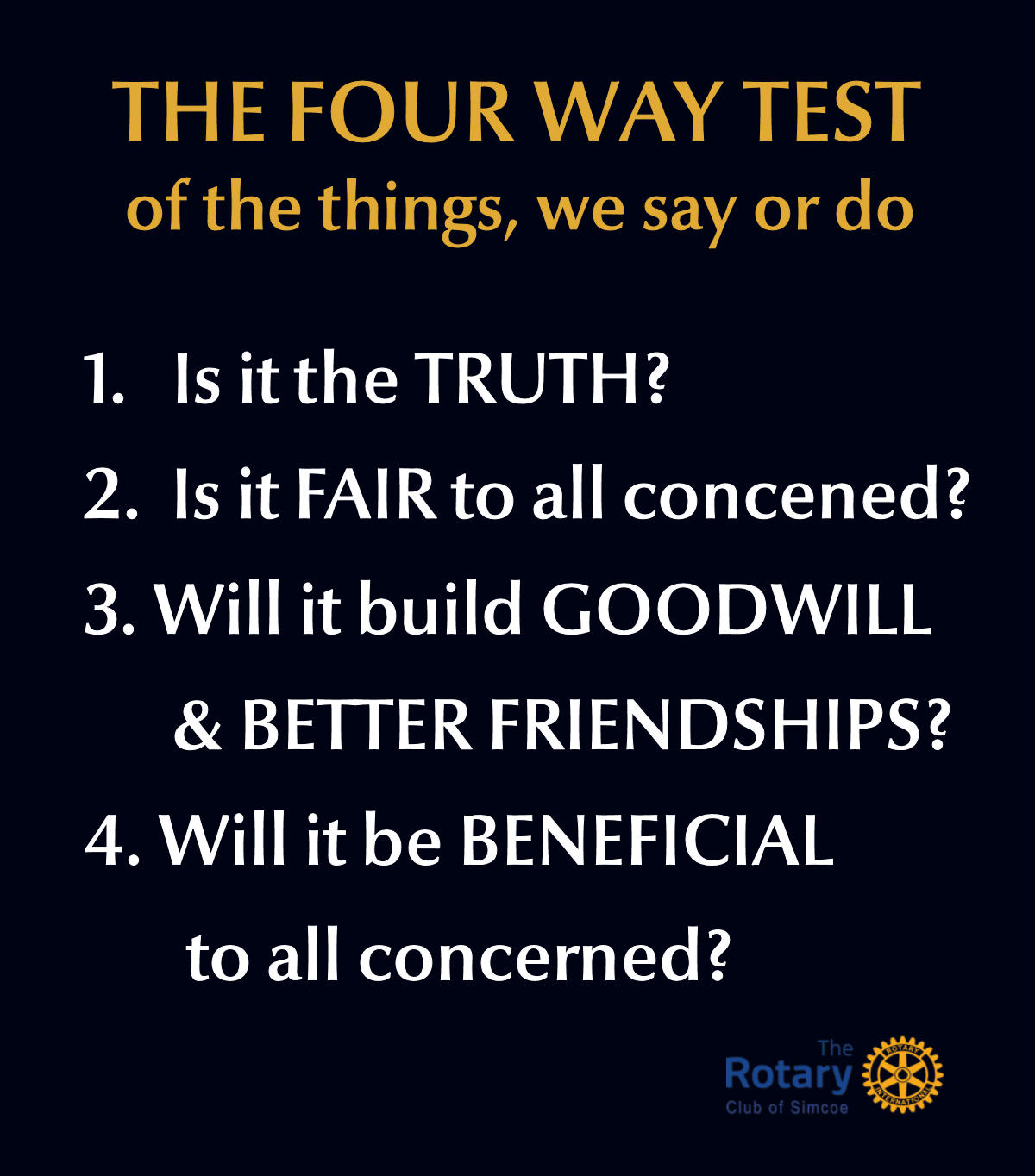
What We Stand For
The mission of Rotary International is to assist and guide Rotarians and Rotary Clubs to accomplish the Object of Rotary to ensure Rotary's continuing relevance and to help build a better world, emphasizing service activities by individuals and groups that enhance the quality of life and human dignity, encouraging high ethical standards, and creating greater understanding among all people to advance the search for peace in the world.
Rotary International

Avenues of Service
The term "Five Avenues of Service" is frequently used in Rotary. The "Avenues" refer to the four elements of the Object of Rotary: club service, community service international service and vocational service. They describe the primary areas of Rotary activity.
- Club Service involves all of the activities necessary for Rotarians to make their club function successfully.
- Community Service pertains to those activities which Rotarians undertake to improve the quality of life in their community. It frequently involves assistance to youth, the aged, the handicapped
and others who look to Rotary as a source of hope for a better life. - International Service describes the many programs and activities which Rotarians undertake to advance international understanding, goodwill and peace. International service projects are designed to meet humanitarian needs of people in many lands.
- New Generations recognizes the positive change implemented by youth and young adults through leadership development activities, involvement in community and international service projects, and exchange programs that enrich and foster world peace and understanding.
- Vocational Service is a description of the opportunity each Rotarian has to represent the dignity and utility of one's own vocation to other members of the club.
Classifications
Membership in a Rotary club is by invitation and was based on the founders' paradigm of choosing one representative or each business, profession and institution in the community. What is called the "classification principle" is used to ensure that the members of a club comprise a cross section of their community's business and professional life.
A Rotarian's classification describes either the principal business or professional service of the organization that he or she works for or the individual Rotarian's own activity within the organization. The classification is determined by activities or services to society rather than by the position held by the particular individual. In other words, if a person is president of a bank, he or she is not classified as "bank president" but under the classification "banking". The classification principle fosters a fellowship for service based on diversity of interest, and seeks to prevent the predominance in the club of any one group.
When a person becomes an active member of a Rotary clubs, it is said that a the member has been "loaned" a classification. He or she may propose one additional active member in that classification. On completing five, ten or fifteen years of service, depending on the individual's age, he or she becomes a "senior active" member and their classification is released to enable another person to join the club.
Declaration of Rotarians in Business and Professions
- Be faithful to the letter and to the spirit of the ethical codes of my vocation, to the laws of my country, and to the moral standards of my community;
- Be faithful to the letter and to the spirit of the ethical codes of my vocation, to the laws of my country, and to the moral standards of my community;
- Do all in my power to dignify my vocation and to promote the highest ethical standards in my chosen vocation;
- Be fair to my employer, employees, associates, competitors, customers, the public and all those with whom I have a business or professional relationship;
- Recognize the honor and respect due to all occupations which are useful to society;
- Offer my vocational talents: to provide opportunities for young people, to work for the relief of the special needs of others, and to improve the quality of life in my community;
- Adhere to honesty in my advertising and in all representations to the public concerning my business or profession;
- Neither seek from nor grant to a fellow Rotarian a privilege or advantage not normally accorded others in a business or professional relationship.
Friendship/Inclusiveness
Rotary began with Founder Paul Harris's desire to find in a large city of Chicago the kind of friendly spirit and helpfulness that he had known in the small towns where he had spent his early years. The formation of the first Rotary club satisfied that need and it was perpetuated as the Rotary movement spread from Chicago to other cities and then became a principle of the association that linked the early clubs together.
The spirit of friendship and service evolved into a focus on helping to build goodwill and peace in the world. In a later year, Paul Harris said: "Rotarians respect each other's opinions and are tolerant and friendly at all times. Catholics, Protestants, Moslems, Jews, and Buddhists break bread together in Rotary." A statement adopted by Rotary International in 1933 recognized that activities and customs that are legal and accepted in some countries may seem strange and contrary to the accepted standards in other countries. It urged tolerance of such differences in these words: "Rotarians in all countries should recognize these facts (differences) , and there should be a thoughtful avoidance of criticism of the laws and customs of one country by the Rotarians of another country. " The policy also cautioned against "any effort on the part of Rotarians of one country to interfere with the laws or customs of another country." The statement is still considered good guidance for Rotarians as they strive to strengthen the bonds of understanding, goodwill and friendship around the world.
Motto Of Rotary International

Early in its history, the members of the first Rotary club realized that fellowship and mutual self-interest were not enough to keep a group of busy professionals meeting each week. Undertaking efforts to improve the lives of others proved an even more powerful motivation. In 1907, the club adopted a practical community service project -- the installation of a public comfort station near the city hall in downtown Chicago.
Three years after the organization of the Chicago club, a second club was formed in San Francisco, California, and three more clubs were founded the following year. By 1910, there were 16 clubs in the United States, and the first convention was held in Chicago where the clubs organized themselves to form the National Association of Rotary Clubs. At that convention, a member of the Chicago club proposed a motto for the new organization, recognizing its commitment to the idea of service: "He Profits Most Who Serves His Fellows Best."
The following year, another early leader spoke of the importance of serving others and promoted the idea that a club should be organized on the principle of "Service, Not Self." The two sayings, modified to "He Profits Most Who Serves Best" and "Service Above Self," were quickly embraced by all Rotarians and were officially designated as Rotary mottoes at the 1950 convention in Detroit, Michigan. In 1989, the Rotary International Council on Legislation established "Service Above Self" as the organization's principal motto.
The Object Of Rotary
- The development of acquaintance as an opportunity for service;
- High ethical standards in business and professions. the recognition of the worthiness of all useful occupations; and the dignifying by each Rotarian of his or her occupation as an opportunity to serve society;
- The application of the ideal of service by every Rotarian to their personal, business and community life;
- The advancement of international understanding, good-will, and peace through a world fellowship of business and professional men and women united in the ideal of service.
Structure/Administration
Rotary is organized at club, district and international levels to carry out its program of service around the globe. Rotarians are members of their clubs, and the clubs are members of the global association known as Rotary International. Each club elects its own officers and board of directors and enjoys considerable autonomy within the framework of its constitution and the constitution and bylaws of Rotary International.
Clubs are grouped into Rotary districts, each led by a district governor who is an officer of Rotary International and represents the RI board of directors in the field. During the 1995-96 Rotary year, there are 515 districts. The number can increase as new clubs are chartered. A 19-member board of directors, which includes the international president and president-elect, administers Rotary International. The board meets quarterly to establish policies and programs, with input from committees representing all parts of the Rotary world.
While the Rotary International president is chief executive of the organization, the active managing officer is the general secretary who heads a staff of about 450 persons working in one of nine centers around the world. The international headquarters is in the Chicago suburb of Evanston, Illinois.

.png)












